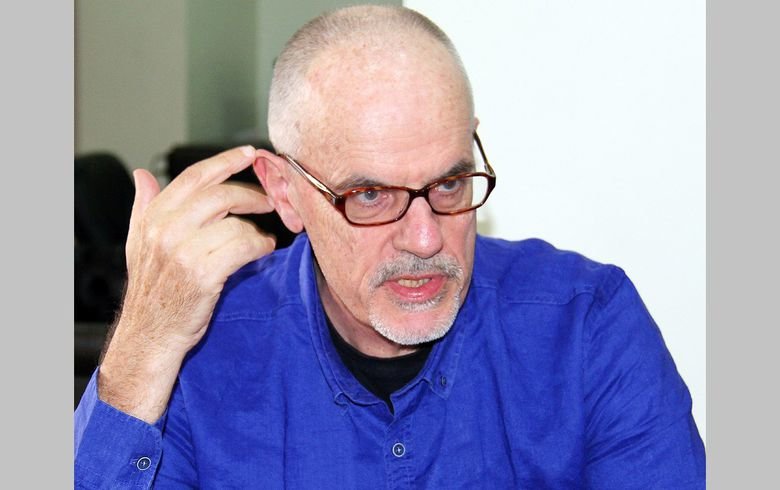Mideast policies show Trump doesn’t run Washington: Tim Anderson

TEHRAN - Professor Tim Anderson, a senior lecturer in political economy at the University of Sydney and the author of The Dirty War on Syria, says following Donald Trump’s inauguration, it quickly became apparent that his words must be taken “with a grain of salt” and that he does not run Washington.
In an interview with the Tehran Times, Anderson said Trump has to find some accommodation with his own country’s “deep state” in order to retreat from the failing Middle East wars created by his predecessors.
“However we can say that Trump, for all his arrogant bluster, including threats against Iran, must be reluctant to begin any new escalation,” he said.
The full transcription of the interview has been given below:
Q. How important do you think the Astana talks are for establishing peace in Syria?
A: They are important to help Turkey (and some others) adjust to the new reality, that they have not been able to destroy an independent and pluralist Syria. Turkish leaders, in particular, are being encouraged to accept the fact that, as their proxy armies lose the war, they should look for some ‘face saving’ way to retreat and end the terrorism. An important first step was made in this regard by the Russian-Turkish agreement over the retreat and evacuation of the remainder of the al Qaeda armies from Aleppo city, as the civilians were freed. The Syrians amongst the various al Qaeda groups are also being given a last chance to find a way out.
“Saudi regional ambitions must find a place within wider U.S. ambitions. Even though they are the biggest purchaser of U.S. weapons, they must be authorized to use them, whether in Syria or Yemen or anywhere else. For all its money, al Saud is a family and not a nation. It has a fragile political base.”Q: What is your analysis of Obama’s policy toward the Syrian conflict?
A: The Obama administration showed itself incapable of playing a constructive role, in particular by refusing to cooperate in the suppression of designated terrorist groups or to separate them from what they insisted on calling ‘moderate rebels’. On the contrary, Obama kept providing material support to these terrorist groups.
Q. What role are Russia, Iran and Turkey playing in the Syrian crisis?
A: Russia and Iran are working together to encourage the Turkish leadership to resolve its ambitions as regards Syria. Turkey and Syria must have some new understanding, if there is to be peace in the region. The Erdogan administration, for its part, is looking for a new regional role, after its disillusion with the U.S. (which it blames for backing last year’s coup attempt), the failure of its proxy armies in Syria and with its renewed strategic relationship with Russia. Although strategic partners Iran and Russia have different positions on the U.S. Iran sees no constructive role for Washington in the region. Russia, however, wants to help the U.S. find some face-saving way out of its failed proxy wars against both Syria and Iraq. This is because Russia maintains a wider agenda, trying to defuse U.S. aggression in the eastward expansion of NATO, and in blocking Russia’s relations with Europe.
Q. How would the U.S. involvement in the conflict change during Trump’s tenure?
A: That depends on how internal tensions within the new Trump administration are resolved. Trump had one very good theme during his presidential campaign: retreat from the failing Middle East wars created by his predecessors, develop better relations with Russia and Syria to suppress terrorism, and even reject the idea of U.S. ‘exceptionalism’. However it quickly became apparent that Trump’s words must be taken ‘with a grain of salt’, and that he does not run Washington. He has to find some accommodation with his own country’s ‘deep state’. The outcome of that internal struggle remains to be seen. However we can say that Trump, for all his arrogant bluster, including threats against Iran, must be reluctant to begin any new escalation.
Q. How about Saudi Arabia’s involvement? Do you think the Saudis have become more hawkish following the Trump victory?
A: There were some notable clashes between Trump and al Saud during the U.S. presidential campaign. But that was not determinative, as Trump says much and then acts differently. The Saudis will be using all their influence in Washington to rebuild the relationship they enjoyed under Bush-Obama-Clinton. If Trump eventually retreats from the region, they will have to accept that. Saudi regional ambitions must find a place within wider U.S. ambitions. Even though they are the biggest purchaser of U.S. weapons, they must be authorized to use them, whether in Syria or Yemen or anywhere else. For all its money, al Saud is a family and not a nation. It has a fragile political base.
Leave a Comment